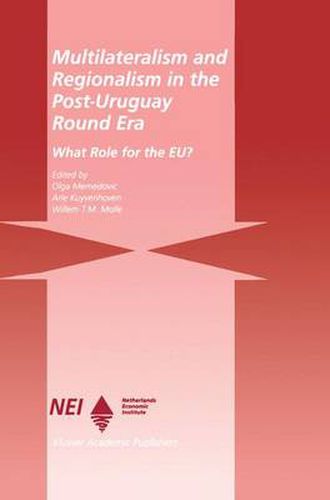Readings Newsletter
Become a Readings Member to make your shopping experience even easier.
Sign in or sign up for free!
You’re not far away from qualifying for FREE standard shipping within Australia
You’ve qualified for FREE standard shipping within Australia
The cart is loading…






This title is printed to order. This book may have been self-published. If so, we cannot guarantee the quality of the content. In the main most books will have gone through the editing process however some may not. We therefore suggest that you be aware of this before ordering this book. If in doubt check either the author or publisher’s details as we are unable to accept any returns unless they are faulty. Please contact us if you have any questions.
The Post-Uruguay Round era has seen a proliferation of regional preferential trade agreements (PTAs), as well as progressive multilateral trade liberalization initiatives. This has stimulated theoretical discussion on whether the policy of pursuing PTAs will have a malign or a benign impact on multilateralism. In the former case, proliferation of PTAs may increase protection in global trade due to trade diversion effects, thereby creating impediments to the multilateral freeing of global trade. In the latter case, the expansion of PTA membership could ultimately lead to non-discriminatory global free trade. At the core of this discussion two issues are at stage: what determines the expansion of PTA membership and how to bring order into the architecture of the world trading system. While those questions are mainly studied from a specialist perspective in the literature, this volume offers a comprehensive view on this topic. In this text international experts: explain the reasons for the concurrent appearance of regionalism and multilateralism in the Post-Uruguay Round era; shed light on the motives of both the two economic superpowers (the United States and the EU) and the developing countries for pursuing PTAs; confront growing preferential regionalism with the academic consensus on the superiority of multilateralism; discuss the future of the PTAs; assess the access of the EU market for the products of LDCs; offer a better understanding of the experience of African, Latin American and Asian countries concerning access to the EU market for their products; and discuss the possibilities of disciplining the PTA route towards global free trade within the WTO framework.
$9.00 standard shipping within Australia
FREE standard shipping within Australia for orders over $100.00
Express & International shipping calculated at checkout
This title is printed to order. This book may have been self-published. If so, we cannot guarantee the quality of the content. In the main most books will have gone through the editing process however some may not. We therefore suggest that you be aware of this before ordering this book. If in doubt check either the author or publisher’s details as we are unable to accept any returns unless they are faulty. Please contact us if you have any questions.
The Post-Uruguay Round era has seen a proliferation of regional preferential trade agreements (PTAs), as well as progressive multilateral trade liberalization initiatives. This has stimulated theoretical discussion on whether the policy of pursuing PTAs will have a malign or a benign impact on multilateralism. In the former case, proliferation of PTAs may increase protection in global trade due to trade diversion effects, thereby creating impediments to the multilateral freeing of global trade. In the latter case, the expansion of PTA membership could ultimately lead to non-discriminatory global free trade. At the core of this discussion two issues are at stage: what determines the expansion of PTA membership and how to bring order into the architecture of the world trading system. While those questions are mainly studied from a specialist perspective in the literature, this volume offers a comprehensive view on this topic. In this text international experts: explain the reasons for the concurrent appearance of regionalism and multilateralism in the Post-Uruguay Round era; shed light on the motives of both the two economic superpowers (the United States and the EU) and the developing countries for pursuing PTAs; confront growing preferential regionalism with the academic consensus on the superiority of multilateralism; discuss the future of the PTAs; assess the access of the EU market for the products of LDCs; offer a better understanding of the experience of African, Latin American and Asian countries concerning access to the EU market for their products; and discuss the possibilities of disciplining the PTA route towards global free trade within the WTO framework.